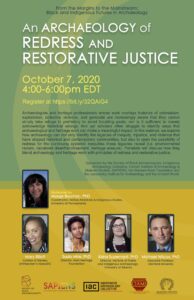Webinar 10/7: An Archaeology of Redress and Restorative Justice

General
On Wednesday, October 7th the Wenner-Gren Foundation co-sponsored, “An Archaeology of Redress and Restorative Justice”.
Archaeologists and heritage professionals whose work overlays histories of colonialism, exploitation, collective violence, and genocide are increasingly aware that they cannot simply take refuge in prehistory to avoid troubling pasts; nor is it sufficient to merely acknowledge historical wrongs. And yet scholars often struggle to identify ways that archaeological and heritage work can make a meaningful impact. In this webinar, we explore how archaeology can not only identify the legacies of inequity, injustice, and violence that have shaped historical and contemporary communities, but also to open the possibility of redress for the continuing systemic inequities these legacies reveal (i.e. environmental racism, racialized disenfranchisement, heritage erasure). Panelists will discuss how they blend archaeology and heritage work with principles of redress and restorative justice.
Panelists
Mary Elliott, Curator of Slavery, Smithsonian’s National Museum of African American History and Culture (NMAAHC)
Sada Mire, PhD, Director, Horn Heritage Organisation
Kisha Supernant, (Métis Nation of Alberta), PhD, Director, Institute of Prairie and Indigenous Archaeology, University of Alberta
Michael Wilcox (Yuman/Quechan descent), PhD, Senior Lecturer in Native American Studies, Stanford University
Moderator
Margaret Bruchac, (Abenaki), PhD, Coordinator, Native American & Indigenous Studies, University of Pennsylvania
CART captioning will be provided by Lori Stavropoulos.
Sponsored by the Society of Black Archaeologists, Indigenous Archaeology Collective, Brown University’s Joukowsky Institute for Archaeology and the Ancient World, Cornell Institute of Archaeology and Material Studies, Wenner-Gren Foundation for Anthropological Research, and SAPIENS
While Wenner-Gren is proud to be providing a platform for this event, the views expressed do not necessarily reflect those of the Foundation.